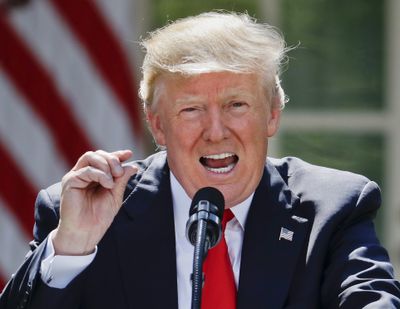Sue Lani Madsen: Paris accord about political science, not climate science

On Thursday, a President kept a campaign promise. The U.S. officially pulled out of a non-binding treaty setting unattainable voluntary goals.
Submitting to peer pressure, 195 countries signed on. Dangling the hope of $100 billion per year in payoffs from the developed nations (meaning us) bought the participation of countries blocked from developing with cheap energy like the rest of the world.
The most common progressive arguments for sticking with the Paris Climate Accord boiled down to its superficiality. “It imposes absolutely no practical or legal constraint on (America’s) actions – not on trade policy, not on domestic energy policy, nothing.” That’s what proponent David Roberts had to say about it on Vox two days before President Trump made the pullout official.
So naturally after Mr. Trump’s announcement, Roberts described it as “an unwise and immoral decision – bad for U.S. interests, bad for humanity, and bad for future generations.”
In other words, it’s totally toothless and yet vital to the future of humanity.
Amy Harder, writing on energy issues for online news magazine Axios, was present in the Rose Garden and overheard the background chatter. “To the Trump administration, the Paris climate deal has nothing to do with climate change. It’s an economic issue. To Trump, withdrawing from the accord represents a triumph of populist America over greedy globalism.”
We’ve been through this before with the Kyoto protocol. One president signed a treaty and never submitted it to the Senate for ratification. The next president said nevermind. We met the 2012 Kyoto emissions reductions targets anyway. Reduced emissions may partly be due to the economy tanking in 2008, but that just bolsters the argument for pulling out of the Paris accord on national economic grounds.
Global companies will continue to make global decisions. The larger trend has been for big businesses to head towards the greater efficiency that brings with it lower emissions. That means both investing in cleaner energy technology in the United States, and outsourcing production to countries which pledged to wait longer to start working cleaner. Nothing has changed, and little would have been changed by hanging out with the Paris crowd.
The Paris accord is about peer pressure to conform to the soft political science of climate change, not so much about climate science. It’s political science because open debate is the essence of hard scientific inquiry, especially important when the subject has the complexity of climate. And open scientific debate is not what the Paris political photo op was about.
Climate models, like economic models, are only as good as the data that can be modeled. Models discard or discount data that cannot be controlled or measured, using assumptions and necessarily imperfect proxies. A data driven science debate would cite studies A, B and C and invite critics to respond with studies X, Y and Z. As a political science debate, the critical response is too often a disdainful dust-off as a denier from those who use science as a matter of faith that can never be wrong.
Except when it is. Like the scientific consensus from the 1970s, certain we were headed into a crippling ice age. Or that the entire world save western Europe, Australia and North America would be wracked by famine by the 2000s or sooner. Or the still unfulfilled promise of flying cars and jet packs (although self-driving cars and drones are pretty cool). Sometimes predictions are wrong because the models have flaws. Sometimes predictions are wrong because complex systems adapt in unexpected ways. And sometimes predictions are just ahead of their time and the science hasn’t caught up yet. Science is never settled.
But government has given us plenty of reason to be skeptical of scientific sounding pronouncements used as the basis of policy. John Stuhlmiller of the Washington Farm Bureau in a recent editorial in the Capital Press pointed out the hypocrisy when different state agencies recently reached radically different conclusions presumably based on science. One praised locomotive diesel engines as meeting “new, stringent emission standards” when hauling passengers. Another blamed the same engines for causing “an unavoidable increase in cancer risk rates in a neighborhood along the rail line” when hauling freight.
Can you blame me for being a skeptic?